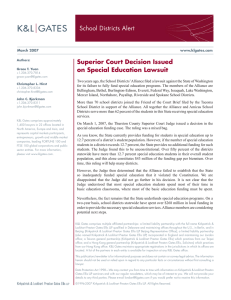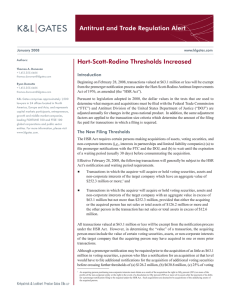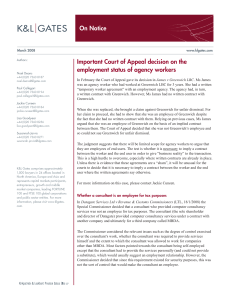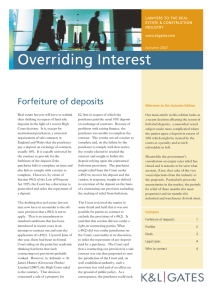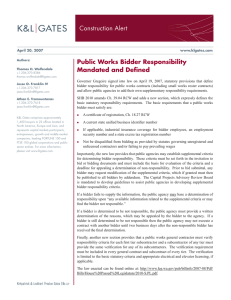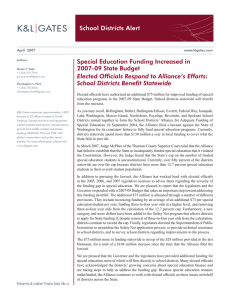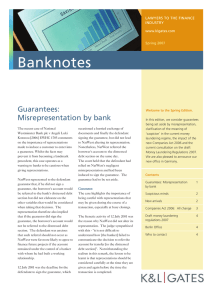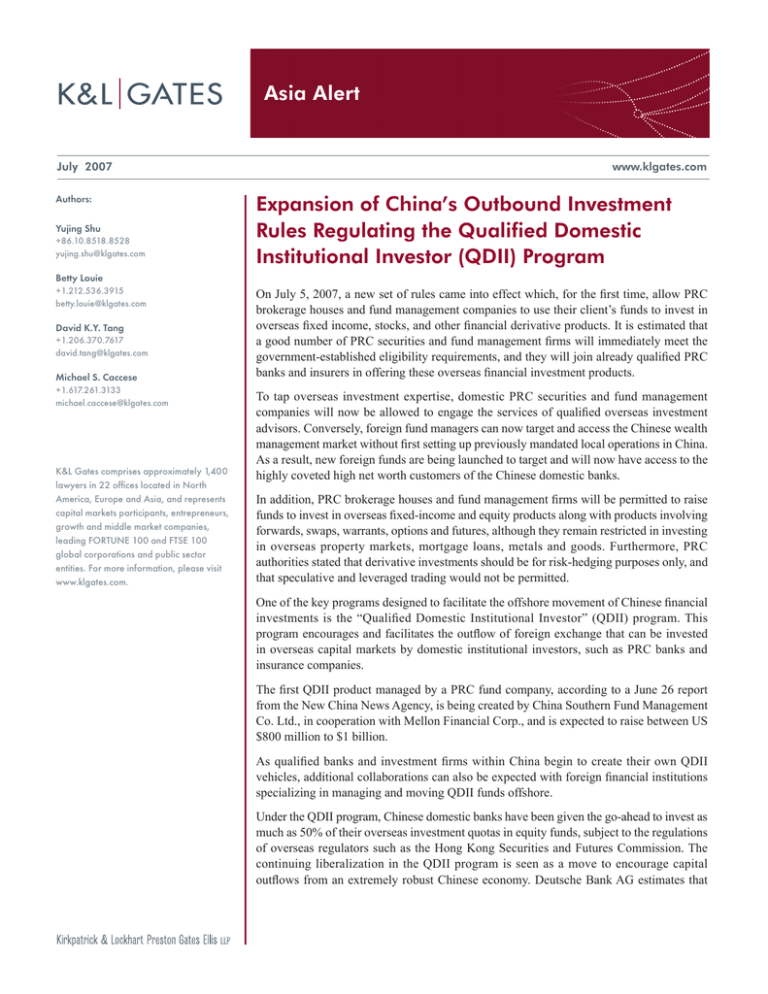
Asia Alert
July 2007
Authors:
Yujing Shu
+86.10.8518.8528
yujing.shu@klgates.com
www.klgates.com
Expansion of China’s Outbound Investment
Rules Regulating the Qualified Domestic
Institutional Investor (QDII) Program
Betty Louie
+1.212.536.3915
betty.louie@klgates.com
David K.Y. Tang
+1.206.370.7617
david.tang@klgates.com
Michael S. Caccese
+1.617.261.3133
michael.caccese@klgates.com
K&L Gates comprises approximately 1,400
lawyers in 22 offices located in North
America, Europe and Asia, and represents
capital markets participants, entrepreneurs,
growth and middle market companies,
leading FORTUNE 100 and FTSE 100
global corporations and public sector
entities. For more information, please visit
www.klgates.com.
On July 5, 2007, a new set of rules came into effect which, for the first time, allow PRC
brokerage houses and fund management companies to use their client’s funds to invest in
overseas fixed income, stocks, and other financial derivative products. It is estimated that
a good number of PRC securities and fund management firms will immediately meet the
government-established eligibility requirements, and they will join already qualified PRC
banks and insurers in offering these overseas financial investment products.
To tap overseas investment expertise, domestic PRC securities and fund management
companies will now be allowed to engage the services of qualified overseas investment
advisors. Conversely, foreign fund managers can now target and access the Chinese wealth
management market without first setting up previously mandated local operations in China.
As a result, new foreign funds are being launched to target and will now have access to the
highly coveted high net worth customers of the Chinese domestic banks.
In addition, PRC brokerage houses and fund management firms will be permitted to raise
funds to invest in overseas fixed-income and equity products along with products involving
forwards, swaps, warrants, options and futures, although they remain restricted in investing
in overseas property markets, mortgage loans, metals and goods. Furthermore, PRC
authorities stated that derivative investments should be for risk-hedging purposes only, and
that speculative and leveraged trading would not be permitted.
One of the key programs designed to facilitate the offshore movement of Chinese financial
investments is the “Qualified Domestic Institutional Investor” (QDII) program. This
program encourages and facilitates the outflow of foreign exchange that can be invested
in overseas capital markets by domestic institutional investors, such as PRC banks and
insurance companies.
The first QDII product managed by a PRC fund company, according to a June 26 report
from the New China News Agency, is being created by China Southern Fund Management
Co. Ltd., in cooperation with Mellon Financial Corp., and is expected to raise between US
$800 million to $1 billion.
As qualified banks and investment firms within China begin to create their own QDII
vehicles, additional collaborations can also be expected with foreign financial institutions
specializing in managing and moving QDII funds offshore.
Under the QDII program, Chinese domestic banks have been given the go-ahead to invest as
much as 50% of their overseas investment quotas in equity funds, subject to the regulations
of overseas regulators such as the Hong Kong Securities and Futures Commission. The
continuing liberalization in the QDII program is seen as a move to encourage capital
outflows from an extremely robust Chinese economy. Deutsche Bank AG estimates that
Asia Alert
approximately US $10 billion will leave China over
the next 12 months while Morgan Stanley predicts a
US $23.4 billion medium-term outflow.
It is an understatement to state that the QDII program
is evolving rapidly. As of July 1, 2007, 19 banks and
three insurers have been granted QDII licenses since
the government launched the domestic institutional
investor scheme in 2004. A continuous steady stream
of announcements of new QDII vehicles can be
expected from the widening range of financial-sector
actors permitted to engage in QDII fund-raising and
placement.
The QDII program in Practice
Since the commencement of the QDII program,
domestic Chinese interest has been building slowly,
due, in part, to the immediate competitive appeal of the
rapidly-appreciating equity prices on China’s domestic
exchanges and the steady (albeit gradual) appreciation
of the RMB against the U.S. dollar. This new widening
of the QDII investor pool could potentially ignite a very
large-scale QDII movement. In addition, there is an
expectation that this opening of new opportunities for
diversification of investments will strike a chord in the
professional investment community within China.
Indeed, the continuous liberalization of the QDII rules,
in short order, suggests several things: a) the hope
that opening new channels to offshore investment
will put a dent in China’s roaring accumulation of
foreign exchange reserves and the economic pressures
resulting therefrom; b) the realization that alternative
investment opportunities are now a pressing concern
to an economy that has always prided itself on a
robust, domestic private and corporate savings and
less on providing investment choices. In short, new
opportunities in China are increasingly available to
foreign investment firms.
K&L Gates comprises multiple affiliated partnerships: a limited liability partnership with the full name Kirkpatrick & Lockhart Preston Gates Ellis LLP qualified
in Delaware and maintaining offices throughout the U.S., in Berlin, and in Beijing (Kirkpatrick & Lockhart Preston Gates Ellis LLP Beijing Representative
Office); a limited liability partnership (also named Kirkpatrick & Lockhart Preston Gates Ellis LLP) incorporated in England and maintaining our London
office; a Taiwan general partnership (Kirkpatrick & Lockhart Preston Gates Ellis) which practices from our Taipei office; and a Hong Kong general
partnership (Kirkpatrick & Lockhart Preston Gates Ellis, Solicitors) which practices from our Hong Kong office. K&L Gates maintains appropriate registrations
in the jurisdictions in which its offices are located. A list of the partners in each entity is available for inspection at any K&L Gates office.
This publication/newsletter is for informational purposes and does not contain or convey legal advice. The information herein should not be used or relied
upon in regard to any particular facts or circumstances without first consulting a lawyer.
Data Protection Act 1998—We may contact you from time to time with information on Kirkpatrick & Lockhart Preston Gates Ellis LLP seminars and with our
regular newsletters, which may be of interest to you. We will not provide your details to any third parties. Please e-mail london@klgates.com if you would
prefer not to receive this information.
©1996-2007 Kirkpatrick & Lockhart Preston Gates Ellis LLP. All Rights Reserved.
July 2007 |

